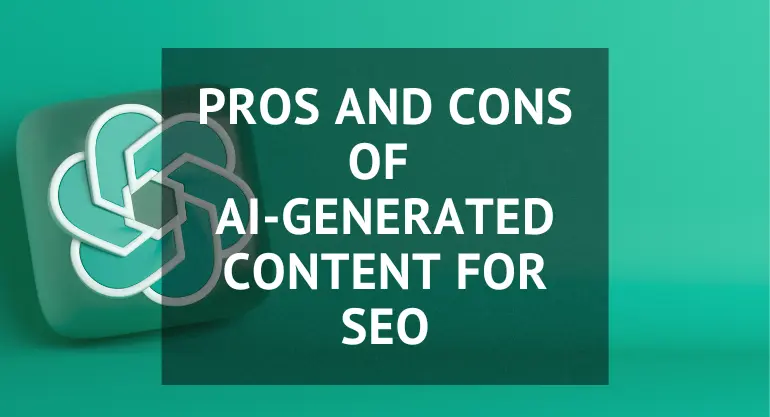The digital marketing realm is always brimming with innovations, and one of the most intriguing of these developments is the use of artificial intelligence (AI) in content creation. AI has been a game-changer in numerous industries, and SEO hasn’t been an exception. As AI’s imprint on SEO becomes more pronounced, there is a growing need to discuss its role in content creation—mainly its pros and cons.
AI and SEO: An Overview
The launch of Google’s RankBrain in 2015 marked a significant milestone for AI in the SEO world. The designers created RankBrain to interpret search queries by understanding their intent, making the user’s search experience more tailored and accurate. Following its introduction, SEO strategies shifted towards providing more context and relevance in content rather than focusing solely on keyword optimization.
Recently, AI has ventured into another important aspect of SEO – content generation. OpenAI, a leading AI research organization, has notably influenced this evolution through its advancements.
AI Content Generation: Under the Spotlight
OpenAI is the brains behind groundbreaking AI tools such as ChatGPT, GPT-3 & GPT=4, reshaping the content creation concept. These AI tools utilize large language models (LLMs) to generate human-like text.
ChatGPT, for instance, is designed to interact in human-like conversations. GPT-3 can generate one million words of text per hour. Tools like these and others, including Neo X, T5, and Bloom, are revolutionizing content production. This raises the question of how this impacts SEO.
The Perks of AI-Generated Content for SEO
AI-generated content offers several enticing benefits:
- Efficiency and Cost-Effectiveness: AI content tools can produce high-quality content quickly and in large quantities, potentially reducing costs associated with hiring content creators.
- Intelligence Augmentation: AI can stimulate ideas for human writers to develop, enhancing creativity and productivity.
- Consistent SEO Strategy: By reducing manual writing effort, professionals can dedicate more time to crafting effective SEO strategies, benefiting from AI’s ability to analyze and coordinate many variables.
- Despite these benefits, it’s also essential to consider the potential downsides.
The Flip Side of AI-Generated Content for SEO
While AI-generated content can be a boon, it’s not without its issues:
- Accuracy Concerns: AI content generation tools prioritize coherence over factual accuracy, potentially leading to misinformation.
- Limited Control Over Content: Certain content categories are avoided by AI tools due to ethical concerns, restricting the scope of topics that can be covered.
- Outdated Information: AI tools work with static datasets, which may result in obsolete content or out-of-touch with current events.
- Biases: AI tools are programmed to produce “safe” content, which may limit their ability to write content in certain styles or tones.
- Search Engine Penalties: Search engines like Google are becoming better at detecting AI-generated content and may penalize it, affecting its ranking.
Forecasting the Future of AI-Generated Content
Even though it might have some adverse effects, AI-generated content will likely stay. It will become an essential tool for repeated SEO chores and help organize SEO strategies.
As AI improves. Human writers will probably take on more of an editing role. Ensure that AI produces accurate, relevant, and original material. The rise of AI-generated content presents a paradox. While it’s a powerful tool for boosting efficiency and consistency in SEO, it could also threaten content accuracy and uniqueness. The key, perhaps, lies in balancing AI tools with human intuition and creativity. To create SEO-friendly, valuable, and engaging content for readers.
In conclusion, as AI evolves, businesses must remain adaptable. Additionally, it is essential to note that rapid advancements in AI technology require companies to constantly adapt their strategies and operations. Furthermore, companies must proactively embrace AI and integrate it into their processes to stay competitive. Moreover, adapting to AI advancements will be crucial for companies to thrive. Ultimately, companies that can navigate effectively integrate AI where it’s beneficial while maintaining a vital human element in their content strategy.



